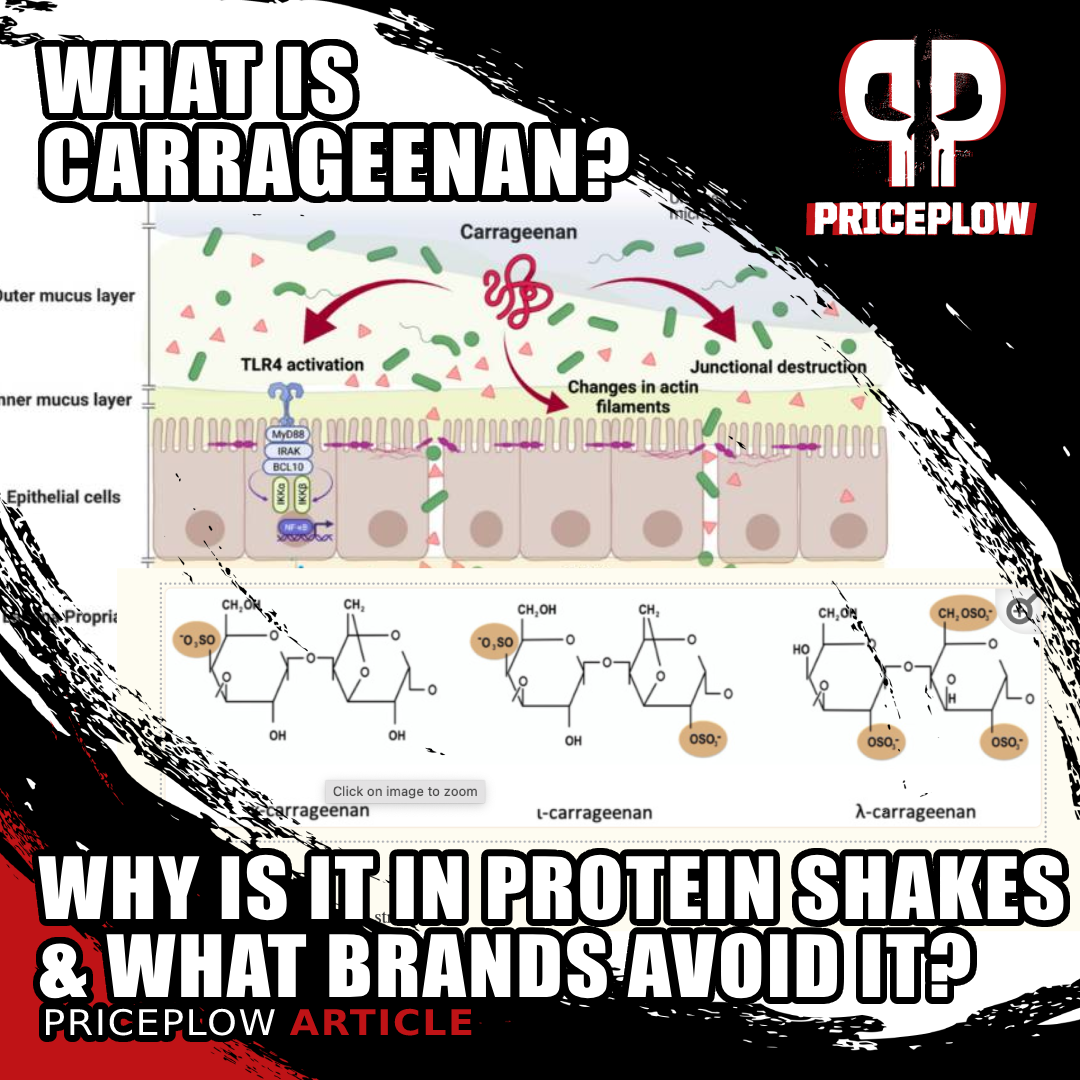
Carrageenan is a common additive that is used to thicken and stabilize popular RTD shakes like Muscle Milk and Fairlife, but it's linked to gut health concerns and inflammation. For those seeking cleaner options, Jocko Mölk Protein Shake RTD is a great choice.
When you want to build muscle, recover quickly, and fuel an active lifestyle, protein shakes are a go-to option for getting enough protein beyond what you can fit into your normal daily diet.
Ready-to-drink (RTD) protein shakes are especially popular for those living a busy, on-the-go lifestyle. They come in a convenient bottle, already mixed up with lots of great flavors to choose from. However, not all protein shakes are created equal.
Some of the biggest culprits are the additives in these products. One such additive that's become increasingly scrutinized is carrageenan. You'll often see it on the labels of top RTD protein drinks like Muscle Milk and Fairlife's Protein Nutrition Shakes.
Carrageenan, sometimes referred to as "additive E-407",[1] stabilizes and thickens RTD protein shakes, amongst countless other foods. However, it's also sparked controversy for its links to inflammation, gut issues, and even inflammatory bowel diseases (IBD).
This article will explore why carrageenan is used in so many products, why we're wary of drinking protein shakes that include this ingredient, and what cleaner options exist in the RTD protein shake space (there aren't many, sadly) for athletes who value both performance and long-term gut health.
What is Carrageenan?
Carrageenan is a polysaccharide extracted from red algae. It's commonly used as a thickener, emulsifier, and stabilizer in processed foods. Its ability to create smooth textures in dairy and plant-based products, like protein shakes, makes it a popular choice among manufacturers.
Carrageenan is also very cost-effective to use in the manufacturing process, which is why it's a go-to option for mass-produced products that you'll find in stores like Costco and Walmart, where texture and consistency matter to general consumers nearly as much as high margins for the businesses involved.
However, carrageenan's potential to negatively impact gut health[2] and increase inflammation[3] can cause more harm than good for athletes and health-focused consumers who want to reach their fitness goals with a well-rounded protein shake.
That's why companies like Jocko Fuel, the sponsor of this article, are spending the time and money to create better options that don't use additives like carrageenan, which can negatively affect your well-being.
This increases production costs and takes longer. However, Jocko Fuel spends the extra time and money to do things right by focusing on natural ingredients, minimizing the total number of ingredients on labels, and ensuring the ones they use have net-positive benefits for your health. You can hear it from the man himself on PricePlow Podcast Episode #132 with Jocko Willink.
Carrageenan and Its Role in Inflammation
One of the most concerning aspects of carrageenan, especially for athletes and anyone trying to build muscle and keep their joint and gut health, is its ability to induce inflammation.[3]
For many years, carrageenan has been used in animal studies to trigger inflammation, allowing researchers to test anti-inflammatory drugs. This process, known as carrageenan-induced paw edema, is well-documented and highlights the compound's potential to promote inflammation in the body.[3]
Carrageenan influences inflammation by stimulating the production of pro-inflammatory agents like bradykinin and histamine, which are closely associated with swelling and pain.[4,5]
More alarmingly, this inflammation isn't limited to short-term exposure. Long-term carrageenan consumption is now linked to chronic inflammation and conditions that affect gut health, such as leaky gut, where the intestinal barrier becomes compromised, allowing toxins and bacteria to enter the bloodstream.[6]
This is particularly troubling for athletes and anyone trying to get in shape. Inflammation, even at a low level, can hinder recovery, impair digestion, and make it harder for the body to absorb the nutrients necessary for optimal performance. The only inflammation we want is in the muscles after a hard workout -- not in the gut! But it gets worse:
Carrageenan in Inflammatory Bowel Diseases (IBD)
The link between carrageenan and gut health issues extends beyond acute inflammation. Studies have shown that carrageenan consumption may exacerbate conditions like Crohn's disease and ulcerative colitis. For those with IBD, carrageenan can worsen symptoms by altering the gut microbiota and triggering immune responses that lead to intestinal inflammation.[2]
Interestingly, diets naturally low in carrageenan, such as the Mediterranean Diet and Specific Carbohydrate Diet (SCD), have shown promise in helping patients manage IBD symptoms.[2] These diets emphasize whole, unprocessed foods and exclude additives like carrageenan.
The takeaway for athletes? If you're dealing with gut issues or trying to optimize your digestive health, it's worth avoiding products that contain carrageenan, especially given its documented links to gastrointestinal inflammation.
No serious dieter wants to buy products containing ingredients that might inhibit the absorption of the otherwise nutritious diet you're eating. Plus, flaring up IBD symptoms or simply having poor digestion can cause stomach pain,[7] lower sleep quality,[8] and potentially a whole slew of other problems,[9] which won't help you recover after workouts or achieve your best performance in the gym.
Carrageenan and Allergic Reactions
Beyond inflammation and gut health concerns, carrageenan has also been linked to allergic reactions,[2] often outside the norm of your typical food allergy.
In some cases, individuals have experienced anaphylaxis, a severe allergic reaction sometimes called anaphylactic shock, after consuming products containing carrageenan.[2] A growing body of research also suggests that carrageenan may be connected to alpha-Gal syndrome, an acquired allergic reaction to red meat caused by eating certain foods.[10]
Even if you don't suffer from food allergies, the potential for carrageenan to trigger immune responses makes it a questionable choice in products marketed to health-conscious consumers, particularly athletes who rely on their bodies to perform at peak levels.
So if you want an RTD protein shake, is all lost? Almost, but there's at least one solid option:
Why Jocko MOLK is a Cleaner, Healthier Option
If the RTD protein shakes you've been drinking have carrageenan (or additive E-407) on the label, you don't have to give them up altogether. Jocko Fuel's MOLK RTD Protein Shake provides a cleaner alternative to get an extra 30 grams of protein in your diet while you're busy and on the go.
The Ingredients Jocko MOLK Uses Instead
Overall, Jocko Fuel has focused heavily on creating supplements that contain natural, high-quality ingredients. This is discussed both in our podcast Episode with Jocko, but also with his formulator and co-founder, Brian Littlefield in Episode #111. They started the company in an effort to minimize the "alphabet soup" of ingredients commonly seen on supplement product labels, including many other top RTD protein shakes you'll find at Costco, Walmart, or any American gas station.
While carrageenan's effects make it a detrimental choice for healthy RTD protein shakes, some ingredients that help stabilize dairy products are necessary to ensure a smooth consistency for protein shakes that are enjoyable to drink. Think about it: If you were to mix up a protein shake and leave it sitting, it would settle after a little while.
Despite that challenge, Jocko Fuel did the necessary research to find better stabilizing ingredients and a production process that would achieve the same effect in their protein drinks without negatively impacting long-term health.
Looking at the label, it appears the primary ingredients used to make Jocko Molk stable and consistent are organic locust bean gum and gellan gum, which are common natural alternatives to carrageenan and better for overall health and well-being. Using these instead of carrageenan isn't as cost-effective or easy to produce, but Jocko Fuel is spending the time and money to ensure they're doing things right.
Are these more expensive? Absolutely. But do they carry the nasty IBS-associative side effects like carrageenan does? No.
Plus, when you research these ingredients, it's clear that the ones they chose actually have net-positive health benefits instead of the detriments that come with preservatives like carrageenan.
-
Organic Locust Bean Gum
Organic locust bean gum is a stabilizer and thickening agent made from the seeds of carob trees. It's a vegan product approved by the National Organic Program for use in organic foods. After reviewing the research, it's clear Jocko Fuel had a well-thought-out plan when using this stabilizer in Jocko Molk because it has several positive benefits for gut health and reduces inflammation.
Research shows that locust bean gum contains long chains of soluble fiber that can improve digestion and help reduce constipation. Its enzymes can also help reduce harmful bacteria and improve the gut's ecological balance.[11]
Other studies also show that locust bean gum can have anti-inflammatory properties that may help treat symptoms of colitis. It does so by increasing the expression of tight junction proteins and the amount of probiotics in the gut.[12]
-
Gellan Gum
Gellan gum is a vegetarian thickener and stabilizer. It'sbeen extensively studied, tested, and demonstrated safe for use in food for over 30 years. The U.S. Department of Agriculture and the World Health Organization's Joint Council on Food Additives approve it.
Research shows that gellan gum can benefit gut health by promoting the growth of probiotic strains and regulating gut microbiota. This keeps your digestive tract running smoothly.[13]
There's also some evidence from research that gellan gum can alleviate constipation by helping foods move smoothly through the gut, further showcasing its potential digestive benefits.[14-16]
Overall, this research shows that gellan gum and organic locust bean gum used as stabilizers in Jocko Molk RTD protein shakes have a net positive benefit, especially when compared to the detrimental effects carrageenan can have on gut health and inducing inflammation.
Other Detrimental Additives Common in RTD Protein Shakes
Along with carrageenan, there are still other potentially detrimental additives you need to be wary of in RTD protein shakes, depending on what you're buying.
-
Artificial Sweeteners
The primary ones you need to watch out for are artificial sweeteners, such as acesulfame potassium and sucralose.
The Jocko GOOD Sweetener is a natural blend of allulose, reb-M (rebaudioside-M), and monk fruit extract that was introduced in Jocko Fuel Hydrate RTD.
Acesulfame potassium is linked to gut health concerns. Research shows it can potentially alter the gut microbiome, leading to obesity and chronic inflammation.[17] It may also trigger symptoms of IBD.[18]
In PricePlow Podcast Episode #111 with Brian Littlefield, we beat this drum quite a bit, but research on sucralose has also shown that it can alter the gut microbiome, potentially causing inflammation and risk of tissue damage.[19] It can also flare up symptoms of leaky gut syndrome and trigger inflammatory responses that contribute to metabolic diseases like insulin resistance.[20]
The World Health Organization (WHO) even issued a global alert about the possible adverse effects of sucralose and other artificial sweeteners in 2023.[21] In the WHO's alert, they were specifically worried about the fact that artificial sweeteners can lead to an increased risk of developing type 2 diabetes[22] and cardiovascular diseases.[23]
The dietary supplement industry uses sucralose quite a bit, and we're generally more supportive of it than other sweeteners, but it's great to know that Jocko Fuel is here for anyone who wants a 100% guarantee that any product will not contain it. They've placed a significant emphasis on avoiding artificial sweeteners, and MOLK doesn't contain any artificial sweeteners.
In fact, Jocko has even created what they call the "GOOD sweetener" for their products. This is a natural blend of allulose, reb-M, and monk fruit extract. These natural ingredients are much healthier and help avoid the adverse impacts on gut health that artificial options typically have.
-
Maltodextrin
Maltodextrin is a preservative, thickener, and bulking agent in Muscle Milk, Fairlife, and other RTD shakes. It's typically made from genetically modified corn.
Research has shown that maltodextrin can cause blood sugar spikes, increase the amount of harmful bacteria in the gut, and increase symptoms of irritable bowel syndrome (IBS).[24,25] These effects make it a poor choice for your digestive system and overall well-being.
While many products contain this preservative, Jocko Molk doesn't, further reinforcing the fact that they don't have any unnecessary ingredients in their products -- even if that costs them more.
-
Heavy Metals
Studies have revealed that many protein powders and RTD protein shakes on the market contain trace amounts of heavy metals like lead, BPA, mercury, cadmium, and arsenic.
The Clean Label Project conducted a study in 2018 that screened 134 of the top-selling protein powders on the market during that time. They found many of these protein powders contained trace amounts of the heavy metals listed above, including 75% of the plant-based protein powders they analyzed.[26]
Another study from Consumer Reports analyzed Muscle Milk, finding that it contained trace amounts of lead, arsenic, and cadmium. In particular, the lead levels in Muscle Milk were higher than what's recommended for health and safety by U.S. Pharmacopeia (USP), a federally recognized authority that sets voluntary standards for health products.[27]
Consuming too many heavy metals in your diet can become toxic or dangerous. It can lower energy levels and damage the brain, liver, lungs, kidneys, and other important internal organs.[28]
What you can be sure of is that Jocko Fuel takes heavy metal testing seriously for its products. Jocko Willink emphasized it in Episode #132 of the PricePlow Podcast, stating that they'd be using better heavy metals testing during production from day one.
Conclusion: Opt for RTD Protein Shakes with a Label You Can Trust
Not all protein shakes are created equal. Unfortunately, many contain ingredients like carrageenan that have the potential to induce inflammation, lead to gut health issues, and even cause bad reactions.
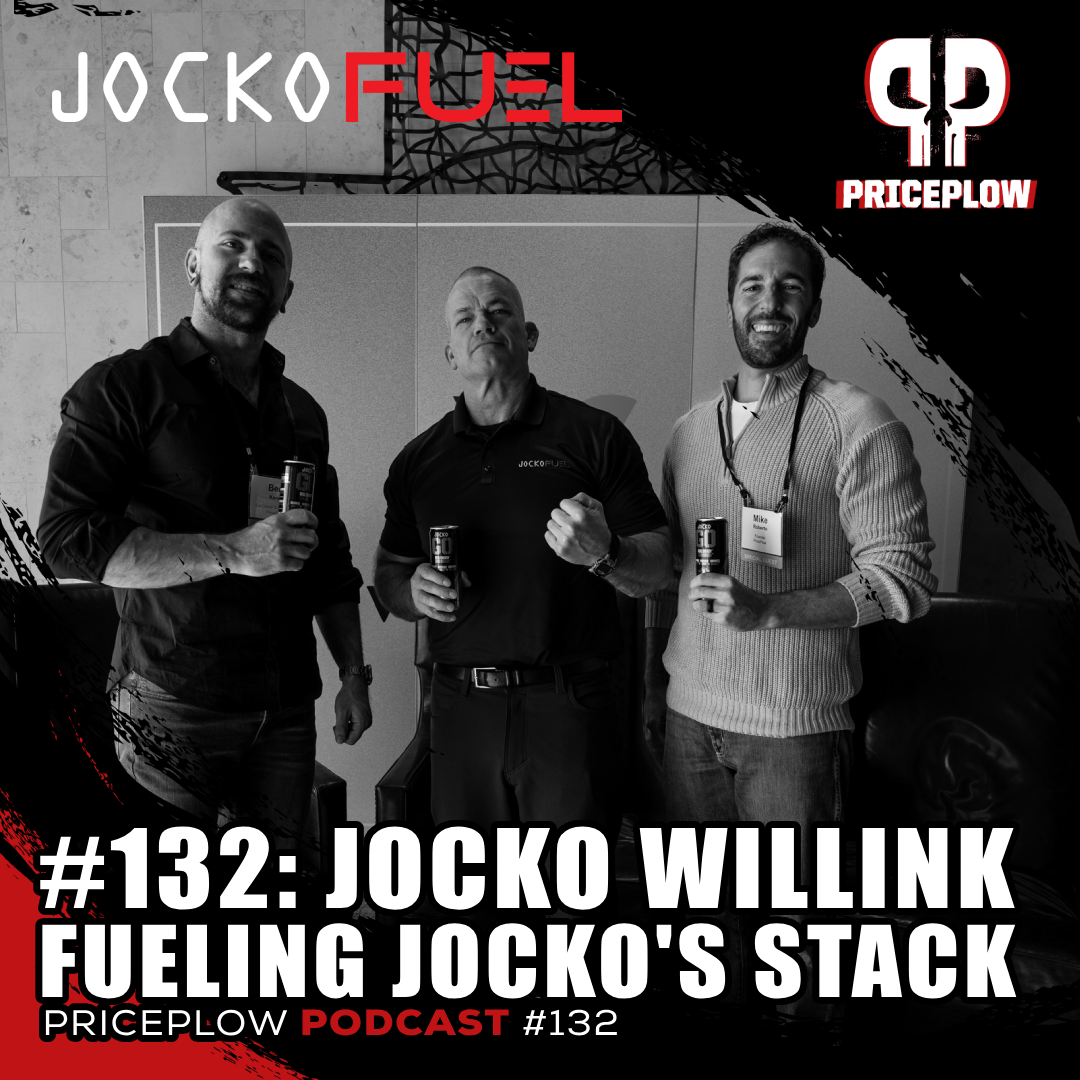
Jocko Willink joins PricePlow for Episode 132 to talk about founding Jocko Fuel, doing the right thing when formulating supplements, and Jocko's entire stack from start to finish
Plus, we can't forget about the whole alphabet soup of ingredients in these products, including the things we don't see on the label, such as the potential for trace amounts of heavy metals in mass-produced proteins that may not take testing as seriously as Jocko Willink and Brian Littlefield.
When you analyze the label on Jocko Molk, you'll notice they simply use very few ingredients. Plus, the ones they use have a purpose, are well-researched to ensure they provide net-positive health benefits, and are natural rather than being artificially produced.
Hopefully, with companies like Jocko Fuel leading the way, we'll see other brands fall in line to continue pushing forward for better nutrition that helps us lead healthier lives. It takes more effort, but the market is moving in this direction, and for a good reason -- good folks like Jocko Willink are simply sick and tired of ultra-processed slop giving people IBS. So they did something about it, and they did something good.
Jocko Fuel MOLK Protein Shake RTD – Deals and Price Drop Alerts
Get Price Alerts
No spam, no scams.
Disclosure: PricePlow relies on pricing from stores with which we have a business relationship. We work hard to keep pricing current, but you may find a better offer.
Posts are sponsored in part by the retailers and/or brands listed on this page.

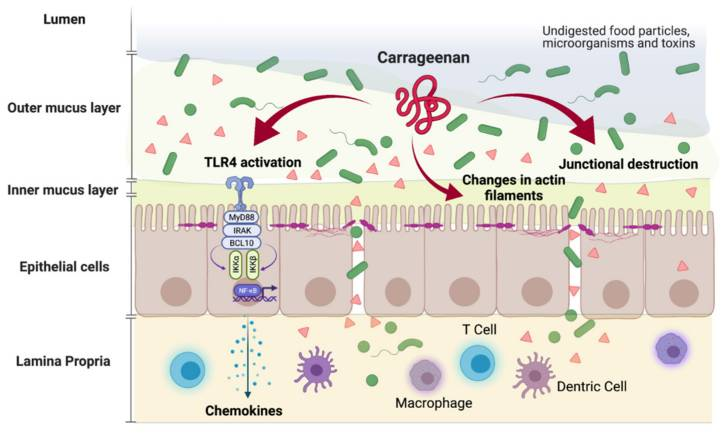
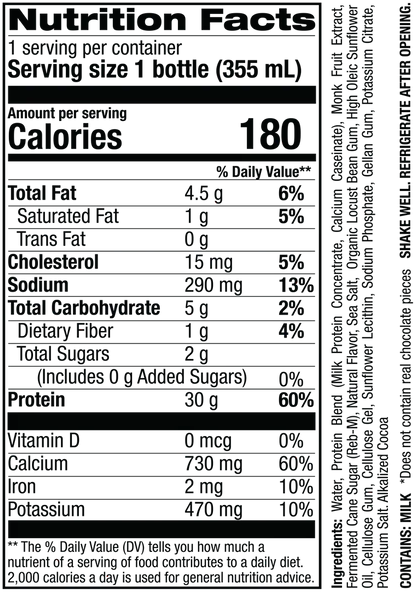
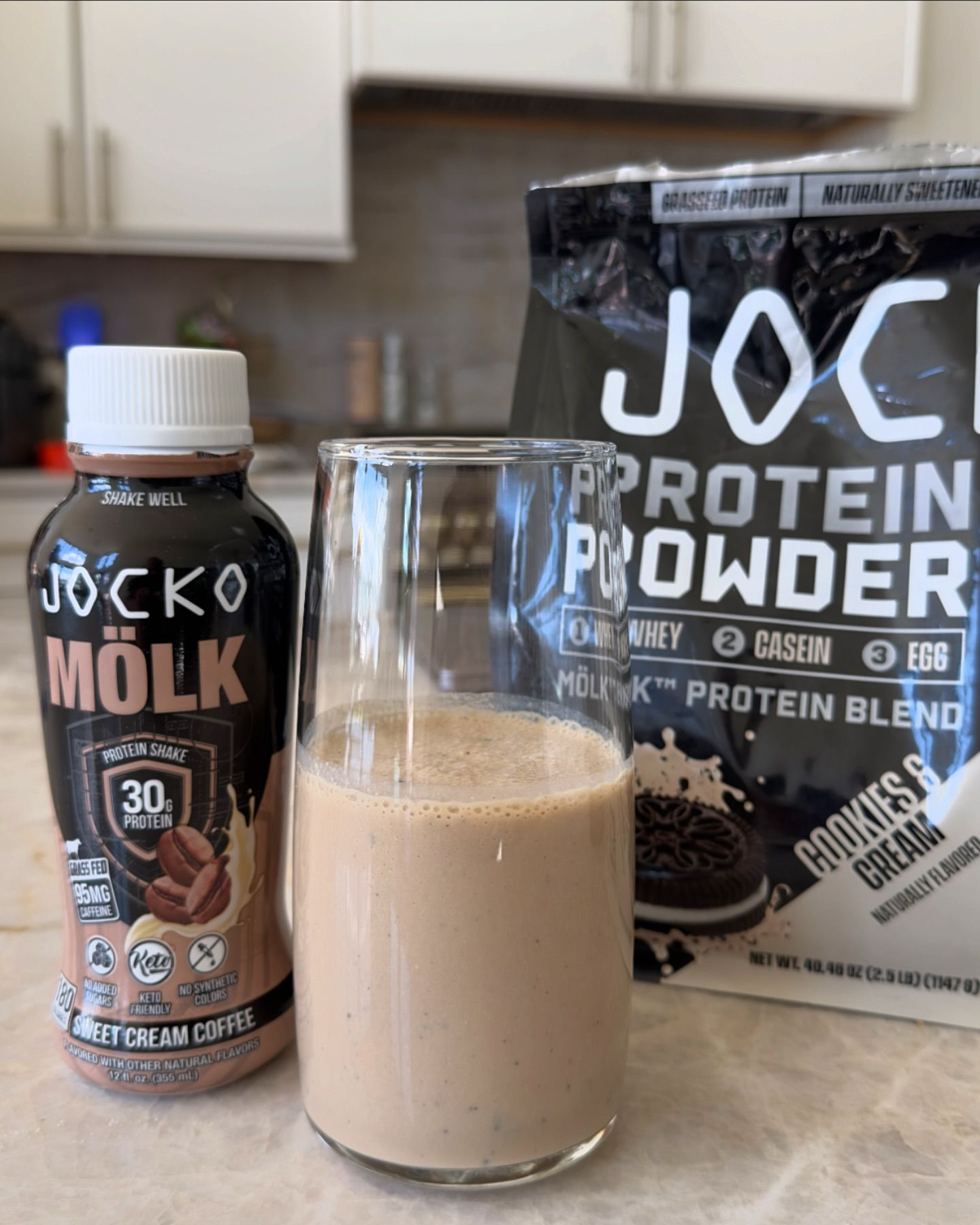
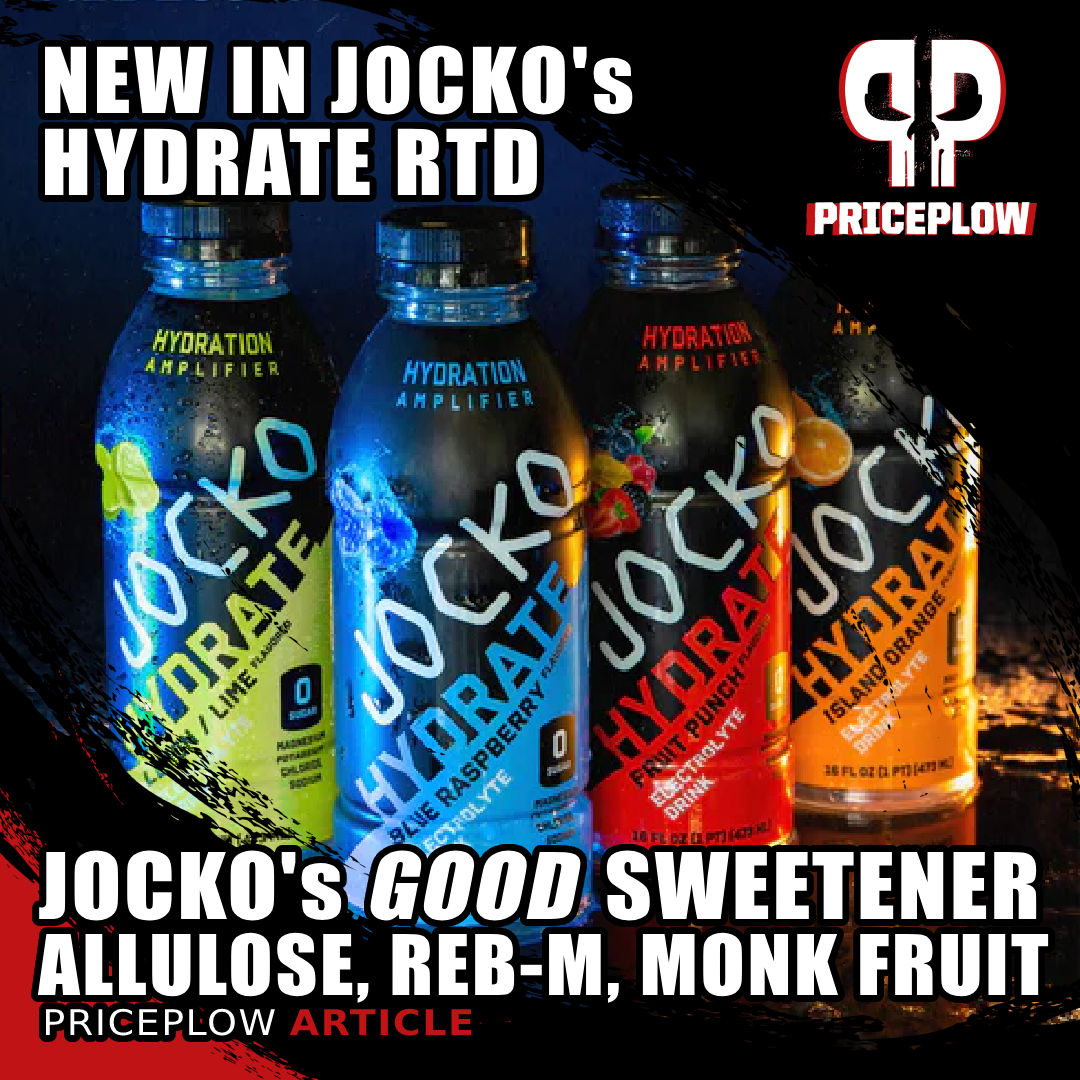
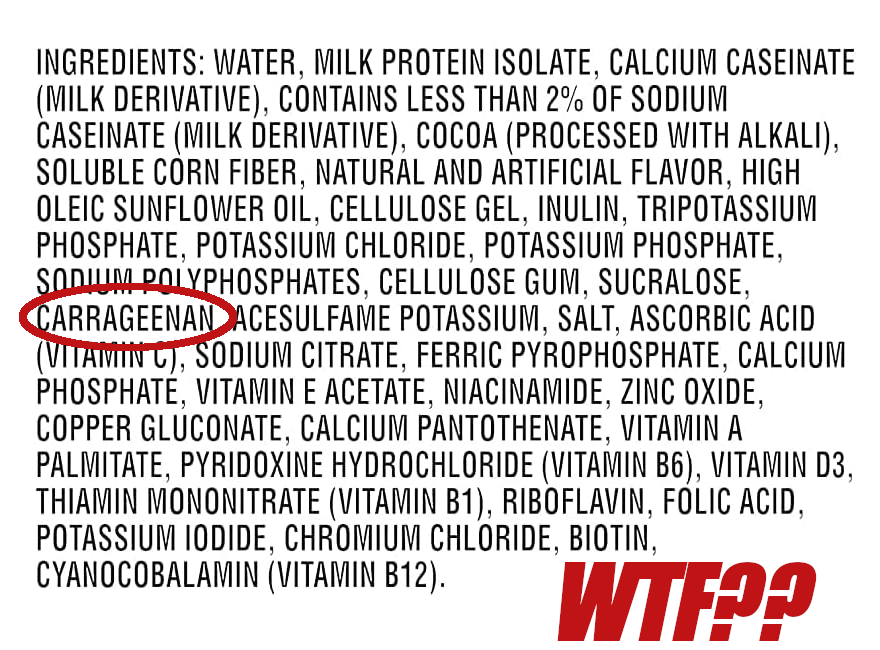


Comments and Discussion (Powered by the PricePlow Forum)